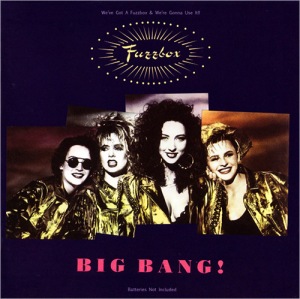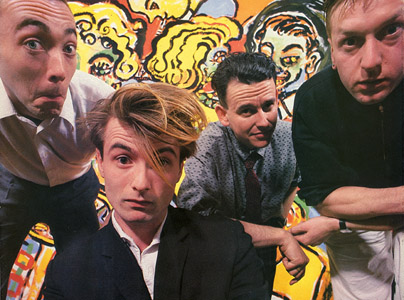 The 1980s are littered with bands who started out with the noblest of indie intentions, but then got seduced and/or corralled into major-label action.
The 1980s are littered with bands who started out with the noblest of indie intentions, but then got seduced and/or corralled into major-label action.
And they didn’t come much more indie than We’ve Got A Fuzzbox And We’re Gonna Use It, the Birmingham-born-and-bred, all-female, John Peel-endorsed quartet which formed in 1985.
By 1988, though they had enjoyed a lone top 40 single, you probably wouldn’t have put much money on them making a claim for serious stardom. But against all odds, they spent most of 1989 as proper pop stars.

Too young to appreciate their early stuff, I had only ever known their ‘pop’ period. But I hadn’t thought about them for over 25 years until the other day when I heard their 1989 single ‘Self’ on Absolute 80s.
I was immediately impressed and intrigued; an irresistible slice of post-Frankie, everything-but-the-kitchen-sink pomp-pop, ‘Self’ features swooning synths, powerhouse drums, strident, Claudia Brucken-esque vocals, a brilliant chorus and even a saucy Brian May guitar solo. How did they do that?
It was all so different back in ’86. Their first UK single, a double A-side of ‘XX Sex’ and ‘Rules And Regulations’, appeared on Vindaloo Records and reached number 41 in March of that year. In December, debut album Bostin’ Steve Austin was released, spawning hilarious first UK Top 40 single ‘Love Is The Slug’.
Further single releases included ‘Rocking With Rita (Head To Toe)’, featuring a version of ‘Itsy Bitsy Teenie Weenie Yellow Polka Dot Bikini’ on the B-side, and even a cover of ‘Spirit In The Sky’.
Clearly a change of direction was needed. Apparently it was WEA A&R gurus Rob Dickins and Bill Drummond who masterminded the band’s assault on the charts, recommending a shortening of their name to Fuzzbox, bringing in songwriter Liam ‘Walk Like An Egyptian’ Sternberg, putting more focus on lead singer Vickie Perks and recruiting session keyboard player Andy Richards to produce the Big Bang album.
Richards’ credentials were exemplary – prior to ’89 he had played on no less than eight ’80s UK number ones: Frankie’s ‘Relax’ and ‘Two Tribes’, George Michael’s ‘Careless Whisper’, Chris De Burgh’s ‘Lady In Red’ and the Pet Shop Boys’ ‘It’s A Sin’, ‘Always On My Mind’ and ‘Heart’. He had also recently produced Prefab Sprout’s ‘Hey Manhattan’.
And, in the short-term, Richards did a sterling job – Big Bang went top 5 and Fuzzbox were pop stars. Three singles from the album got into the top 30 – the infuriatingly-catchy Sternberg co-writes ‘Pink Sunshine’ and ‘International Rescue’ as well as ‘Self’. But the fourth single, a cover of Yoko’s ‘Walking On Thin Ice’, flopped, as did later stand-alone single ‘Your Loss My Gain’. Warners pulled the plug, probably prematurely.
But the story doesn’t end there. Fuzzbox made a comeback in 2010 with a spiffing cover of M’s ‘Pop Muzik’ but sadly lost founding member Jo Dunne in October 2012. After a brief hiatus, they reformed again in 2015 and have just finished touring with The Wonder Stuff. Their YouTube channel claims they are officially the most successful British all-female band. Dispute it at your peril…



